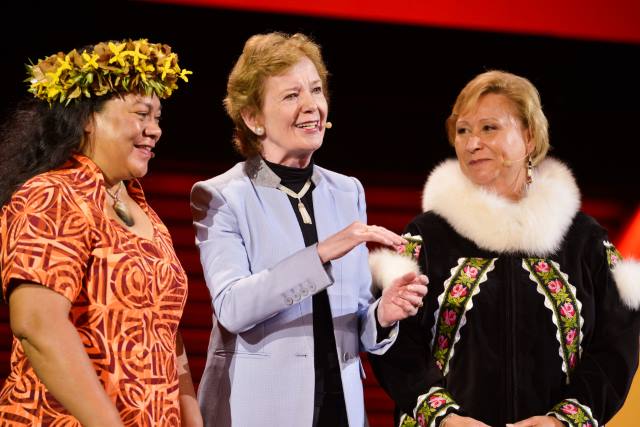A panel discussion on climate displaced people with Mary Robinson, Penelise Alofa from the Kiribati Climate Action Network and Patricia Cochran from the Alaska Native Science Commission highlighted the need for urgent action for climate justice in 2015.
“Climate change is an existential threat. We are the first generation to fully understand the seriousness of climate change and the last generation with time to do something about it” said Mary Robinson, President, Mary Robinson Foundation – Climate Justice, during a panel discussion on the topic “Where Do You Go When the World Disappears?” at the 6th Women in the World Summit today.
Calling on everybody to stand in solidarity with those people and communities who are most affected by the impacts of climate change, Mary Robinson and fellow panellists Penelise Alofa, National Coordinator, Kiribati Climate Action Network, Patricia Cochran, Executive Director, Alaska Native Science Commission brought the whole audience of the Women in the World Summit to their feet.
For people in Alaska, climate change is more than just a discussion. “For us…It’s a reality…we are losing homes” said Patricia Cochran, highlighting that many communities already have to migrate due to the impacts of climate change. She described how her people now have to build sea walls as the sea ice no longer protects the communities from flooding and erosion.
On the other side of the world, in the small island state of Kiribati, climate change induced displacement is also a daily reality. Penelise Alofa told the audience how normal tides are now flooding over the sea walls, destroying livelihoods and threatening her people to leave. She stated:
“When we talk about migration it’s almost a no-no thing for our people. It’s hard to leave, you have a connection to your land. We will leave some behind because they will not move.”
During the discussion, Mary Robinson highlighted the fact that in the last six years, two percent of the Earth’s population has been displaced by climate-related disasters alone and that by 2050 as many as 200 million people are estimated to be displaced by climate change.
She called for urgent action in 2015 – an incredibly important year due to upcoming agreements around financing for development in July, the sustainable development goals in September and the Paris climate agreement in December – to bring the world on a path to a zero carbon world.
All panellists strongly emphasised that it is the women in most households and communities that bring about real change.
“Women are often disproportionally affected by climate change. The face of climate change is a female face and we need to include women in decision making to combat this.” stated Mary Robinson.
Talking about the moral imperative of our generation to act and intergenerational equity, Mary Robinson stated that these issues are human rights issues and stressed that climate change affect the rights and opportunities of the people who are least responsible for causing the problem, which is an injustice.
“We need a human rights framework to deal with these issues.”
The panel discussion was moderated by Juju Chang, Co-Anchor, ABC News Nightline.
Related links
“Solidarity for Mother Earth” – Women in the World Summit coverage of the panel discussion
Our work on equity and climate justice
Read more about human rights and climate justice
Women Leaders’ Forum on Women Leading the Way: Raising Ambition for Climate Action
Grantham annual Lecture 2015 – Why is Climate Justice Relevant in 2015?
Tulele Peisa – Working on a relocation programme for the people of the Carterets Islands
The Nansen Initiative – Find out more about the issues of climate displaced people


